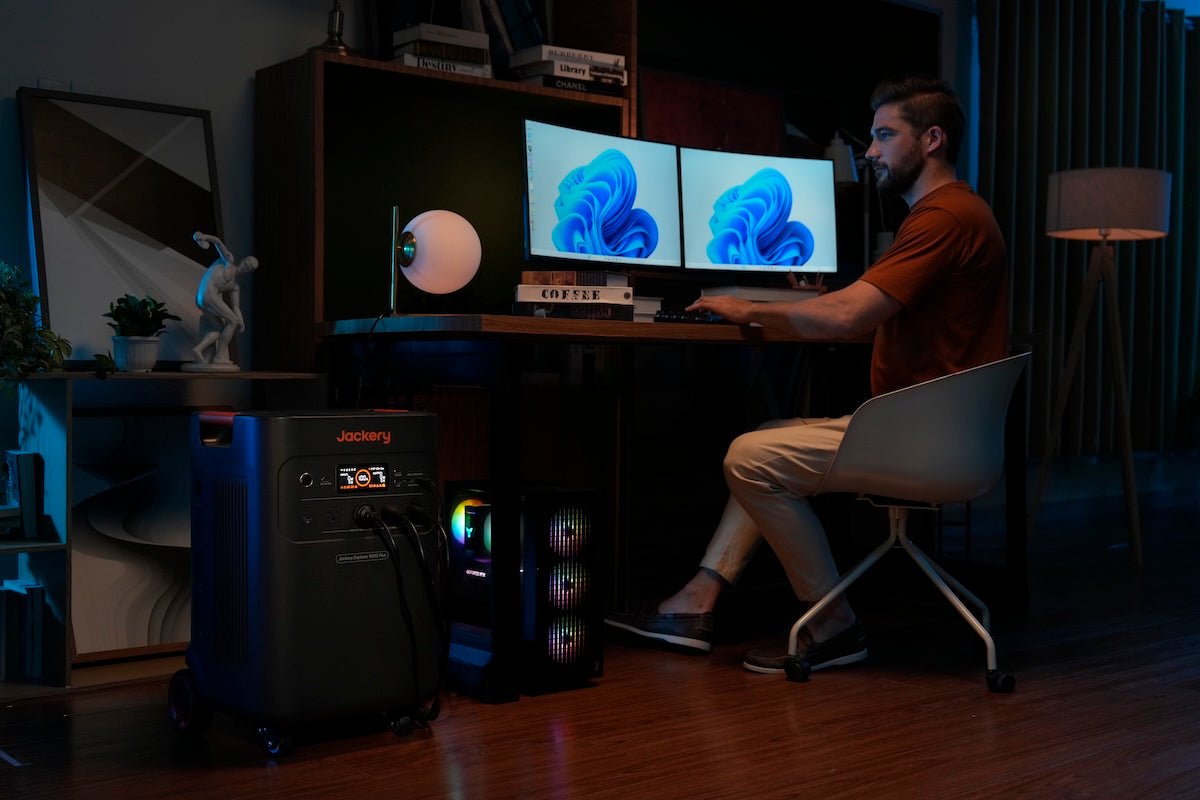Computers are undoubtedly one of the most essential appliances in modern workspaces, especially for remote professionals. But have you ever wondered, "How much does it cost to run a computer?" While computers or laptops consume a small wattage compared to a dishwasher or refrigerator, they still need a decent amount of electricity. On average, you can expect to pay $0.16 - $0.65 daily, $4.77 - $19.44 monthly, and $57.20 - $233.34 yearly to run a 200W computer for 8 hours per day in the US.
If you are looking to reduce the electricity consumption of work-from-home setups or need a dependable battery backup solution to power appliances during outages, you can consider investing in a solar-powered generator. Jackery Solar Generators are particularly useful for keeping laptops, monitors, and other work-from-home appliances running even during outages. These solar generators can also help you reduce your monthly utility bills by reducing the reliance on the grid.
Key Takeaways
- Laptops consume anywhere around 30 - 100W, whereas desktop computers use 200 - 500W per hour.
- Running a computer (200W) for 8 hours daily can cost $0.16 - $0.65 daily, $4.77 - $19.44 monthly, and $57.20 - $233.34 yearly.
- The cost to run a computer or other work-from-home setup appliances will depend on their wattage consumption, the time they are run, and the electricity rate in your area.
- Jackery Solar Generators can help you reduce your electricity bills and power appliances even during outages.
How Many Watts a Computer Consume
Desktop computers consume around 200W—500W, especially during heavy usage like gaming or rendering. On the other hand, energy-efficient laptops require 30W—100W, depending on the screen size and processor load. However, some high-performance PCs need up to 800W, especially when paired with dual monitors and additional accessories like speakers. Once you understand how many watts a computer uses, you can easily calculate the cost of running the appliance.
How Much Does It Cost to Run a Computer
The cost to run a computer or laptop varies based on wattage, usage duration, and local electricity rate. Let's calculate the estimated cost by computer type:
Standard Desktop (200W)
Let's say you are using a standard desktop for 8 hours every day. The power consumption will be 1600Wh or 1.6 kWh per day. If the electricity rate per kWh in the US is 15.95 cents per kWh, the cost to run the desktop will be:
- Daily Cost = Power Consumption × Electricity Cost Per kWh = 1.6kWh × $0.1595 per kWh = $0.25
- Monthly Cost = $0.25 × 30 = $7.65
- Yearly Cost = $7.65 × 12 = $91.87
High-Performance Setup (800W)
Gaming or high-performance desktop setups consume up to 800W. Running the high-performance setup for 5 hours per day will cost you:
- Daily Cost = Power Consumption × Electricity Cost Per kWh = 4kWh × $0.1595 per kWh = $0.64
- Monthly Cost = $0.64 × 30 = $19.14
- Yearly Cost = $19.14 × 12 = $229.68
If you keep the desktops running 24/7 for remote surveillance or other reasons, the costs can triple or quadruple.
Daily, Monthly, and Yearly Costs to Run a Computer
Here's a breakdown of how much it costs to run a computer (200W) in different US states running for 8 hours every day:
|
Wattage |
Usage (Hrs/Day) |
State |
Rate in cents per kWh |
Daily Cost
|
Monthly Cost |
Yearly Cost |
|
200W |
8H |
New Jersey |
19.68 |
$0.31 |
$9.45 |
$113.36 |
|
200W |
8H |
New York |
25.31 |
$0.40 |
$12.15 |
$145.79 |
|
200W |
8H |
Illinois |
15.81 |
$0.25 |
$7.59 |
$91.07 |
|
200W |
8H |
Ohio |
15.64 |
$0.25 |
$7.51 |
$90.09 |
|
200W |
8H |
North Dakota |
9.93 |
$0.16 |
$4.77 |
$57.20 |
|
200W |
8H |
South Dakota |
12.09 |
$0.19 |
$5.80 |
$69.64 |
|
200W |
8H |
Florida |
14.43 |
$0.23 |
$6.93 |
$83.12 |
|
200W |
8H |
Georgia |
13.52 |
$0.22 |
$6.49 |
$77.88 |
|
200W |
8H |
North Carolina |
12.47 |
$0.20 |
$5.99 |
$71.83 |
|
200W |
8H |
South Carolina |
13.81 |
$0.22 |
$6.63 |
$79.55 |
|
200W |
8H |
Texas |
14.68 |
$0.23 |
$7.05 |
$84.56 |
|
200W |
8H |
Montana |
11.41 |
$0.18 |
$5.48 |
$65.72 |
|
200W |
8H |
Nevada |
13.92 |
$0.22 |
$6.68 |
$80.18 |
|
200W |
8H |
New Mexico |
13.73 |
$0.22 |
$6.59 |
$79.08 |
|
200W |
8H |
Utah |
12.12 |
$0.19 |
$5.82 |
$69.81 |
|
200W |
8H |
Wyoming |
11.69 |
$0.19 |
$5.61 |
$67.33 |
|
200W |
8H |
California |
30.22 |
$0.48 |
$14.51 |
$174.07 |
|
200W |
8H |
Oregon |
14.44 |
$0.23 |
$6.93 |
$83.17 |
|
200W |
8H |
Alaska |
24.74 |
$0.40 |
$11.88 |
$142.50 |
|
200W |
8H |
Hawaii |
40.51 |
$0.65 |
$19.44 |
$233.34 |
|
200W |
8H |
US |
15.95 |
$0.26 |
$7.66 |
$91.87 |
Source: Electric Power Monthly - US Energy Information Administration (EIA)
Official Tips to Reduce the Cost to Run a Computer
If you want to reduce the cost of running a computer, you can follow these simple tips from the Energy Star and the US Department of Energy:
- Switch to Energy Star-certified Computers: Desktop computers with the Energy Star label are energy efficient and consume 25%—40% less energy than conventional models.
- Turn On Sleep Mode: Whenever the computer is inactive, consider setting it to enter a low-power sleep mode, which can save nearly $15 per year. As a general thumb rule, you can enable the sleep mode if you want to keep the computer idle for 20 minutes.
- Turn Off the Computer When Not in Use: If you do not plan to use the computer for more than two hours, consider switching off both the CPU and monitor to save energy costs.
- Use Power Strip/Surge Protector: When printers, monitors, and other accessories are not in use for extended periods, switch off the power strip to prevent these components from drawing power even when they are shut off.
- Power Computers With a Solar Generator: The Jackery Solar Generators are essential home backup solutions that can power work-from-home setup appliances like computers, lights, printers, speakers, etc., to lower the reliance on the grid.
How to Save on Your Electricity Bills With Jackery Solar Generators
If you are someone who works remotely, efficiency and power stability are two non-negotiable things. Computers can't afford unexpected shutdowns due to outages. That's where the Jackery Solar Generators come in, especially models with built-in UPS (Uninterrupted Power Supply) functionality.
These Jackery Solar Generators can power computers by quickly switching from grid power to battery backup, ensuring critical appliances like computers keep running during unexpected outages. The UPS functionality prevents data loss and hardware damage while providing you with less on the monthly bills. Here are two of the best battery backups for computers:
Jackery Solar Generator 600 Plus
The Jackery Solar Generator 600 Plus features a compact size, which makes it ideal for remote workstations. It has a UPS switch time of less than 20ms that ensures an uninterrupted power supply to essential appliances like computers, printers, and speakers. It also features an embedded LED light design to offer up to 150 hours of continuous lighting. When you run a computer (200W) for 8 hours daily with the solar generator instead of grid electricity, you can save up to $0.26 daily, $7.66 monthly, and $91.87 yearly.
Appliances Running Time
- Computer (200W) = 2.7H
- LCD Monitor (100W) = 5.4H
- Printer (50W) = 10.7H
- Router (5W) = 107.5H
- Paper Shredder (150W) = 3.6H

Customer Review
"My new Jackery Explorer 600 Plus + SolarSaga 100 x 1 works great for setting up my telescope, cooled camera, and laptop in remote dark sky locations. It provides all the power I need to get me through long night astrophotography sessions." — Chris Moore.
Jackery Solar Generator 2000 v2
The Jackery Solar Generator 2000 v2 is the lightest and smallest 2kWh home battery backup power solution with an instant UPS backup. Its instant 20ms UPS switching mode ensures essential home appliances like computers and the Internet stay on during sudden power outages. The lightweight and portable power station has a foldable handle and can be carried anywhere you go. If you are running a computer (400W) for 8 hours every day with the solar generator, you can save up to $0.51 daily, $15.31 monthly, and $183.74 yearly.
Appliances Running Time
- Computer (200W) = 7.7H
- LCD Monitor (100W) = 14.2H
- Printer (50W) = 24.6H
- Speaker (200W) = 7.7H
- Paper Shredder (150W) = 10.0H

Customer Review
"Due to multiple wildfires this summer in Eastern Oregon, multiple power poles needed to be replaced. From 8 am until 5 pm, our region was cut off from power. We placed our power station in our main office area and were able to accomplish everything needed to keep our business running." — Mike Ferry.
How Much Does It Cost to Run a Computer FAQs
How much does it cost to run a computer 24/7?
The answer to how much it costs to run a computer 24/7 depends on the appliance's power consumption and the cost of electricity in your area. For instance, a typical desktop (200W) running 24/7 in the USA will cost $0.76 daily, $22.96 monthly, and $275.61 yearly.
How much does it cost to run a gaming computer?
A gaming PC consumes 500W per hour, especially during intense gaming sessions. If you game for 4 hours per day, the cost to run a gaming computer will be $0.32 daily, $9.57 monthly, and $114.84 yearly.
How much does it cost to run a 700W computer?
The cost to run a 700W computer depends on how long it is used and the electricity rate in your area. If the electricity rate is 15.95 cents per kWh and the 700W computer runs for 8 hours per day, the monthly cost will be $26.79. Similarly, you can calculate how much it costs to run a computer consuming 450W.
How much does it cost to run a computer fan?
Depending on the specific model, computer fans usually consume around 0.6 - 2 watts. If they are used 24/7, the monthly cost will be $0.06 - $0.22.
Conclusion
Even though the answer to how much it costs to run a computer isn’t higher, unexpected power outages can pause your work. The Jackery Solar Generators with UPS functionality help you lower your electricity bills and even prevent shutting down essential appliances like computers during blackouts. Solar-powered generators will supply electricity to computers and ensure that other accessories, like printers, speakers, lights, etc., remain powered, regardless of where you are.
































































































![[Add - on] Jackery Manual Transfer Switch for Explorer 5000 Plus - Jackery](http://www.jackery.com/cdn/shop/files/add-on-jackery-manual-transfer-switch-for-explorer-5000-plus-9017324.png?v=1754016782&width=420)




















































































































![[Add - on] Jackery Manual Transfer Switch for Explorer 5000 Plus - Jackery](http://www.jackery.com/cdn/shop/files/add-on-jackery-manual-transfer-switch-for-explorer-5000-plus-9017324.png?v=1754016782&width=324)


























